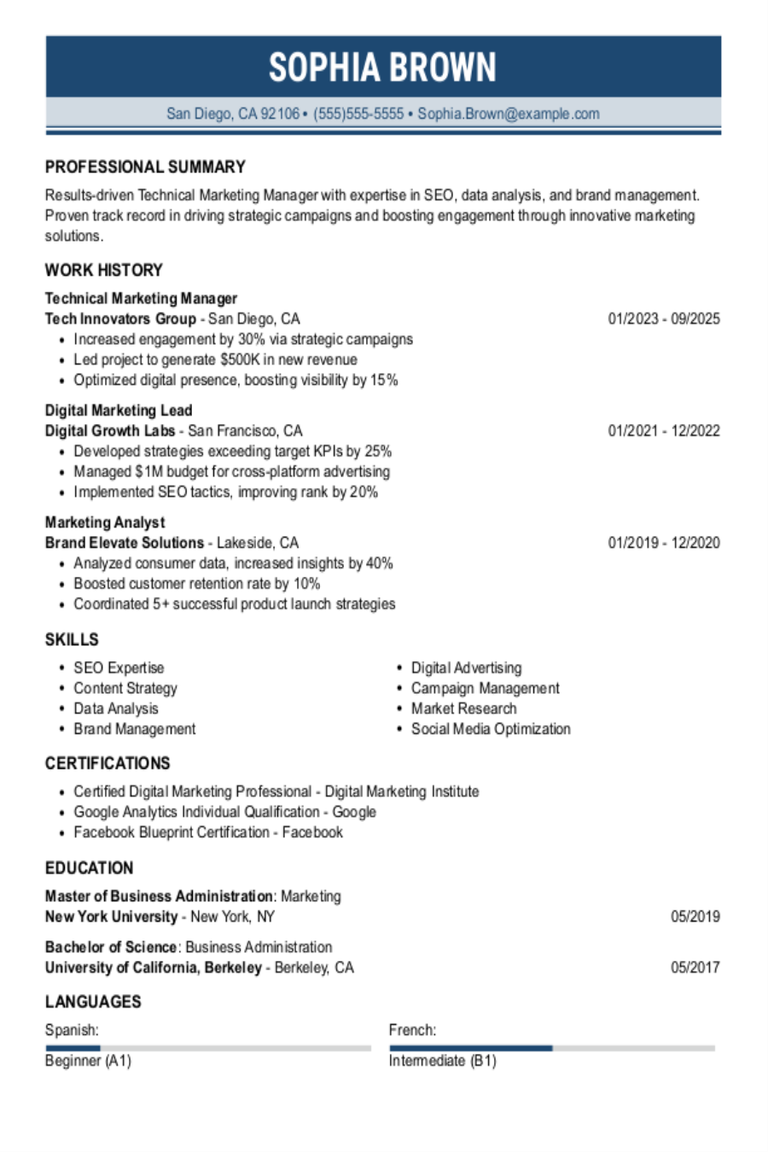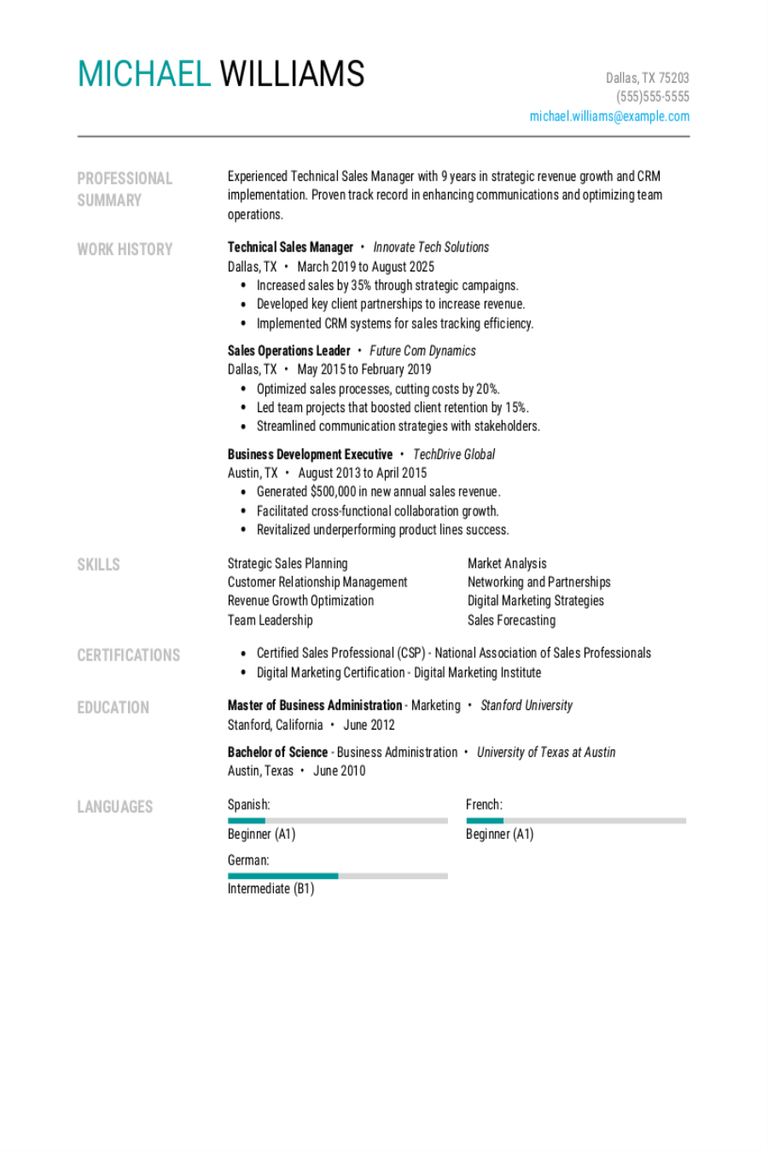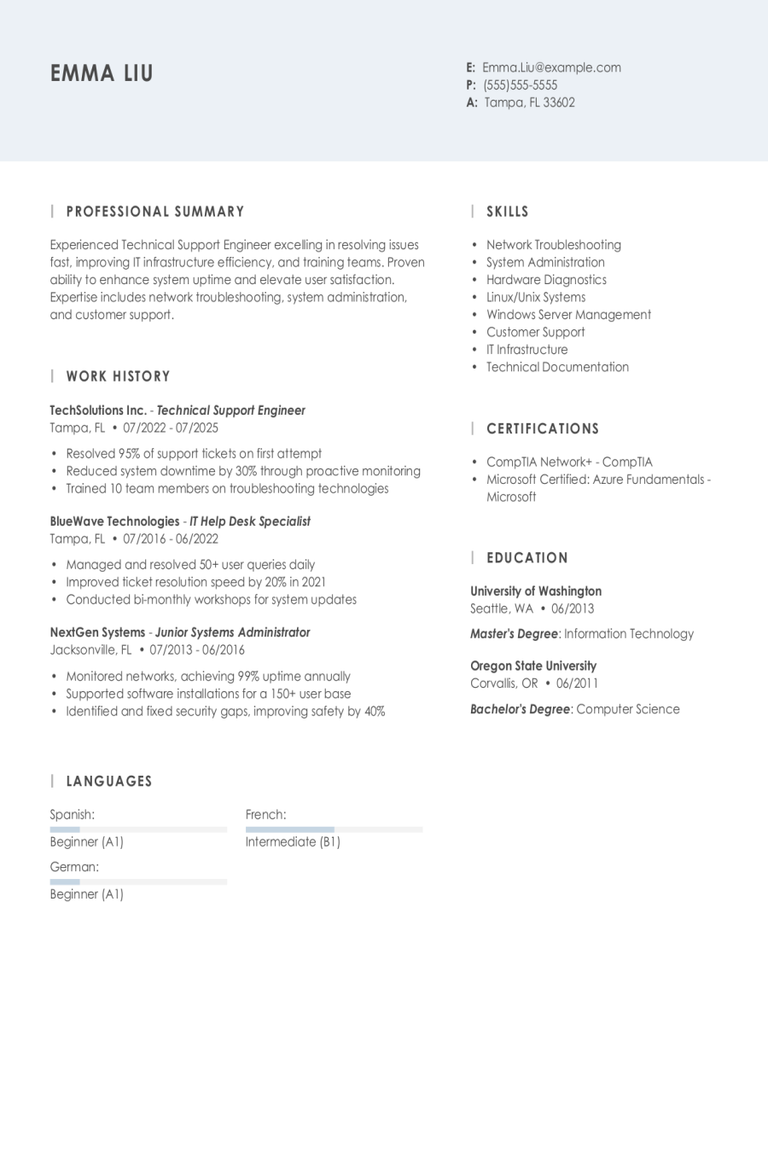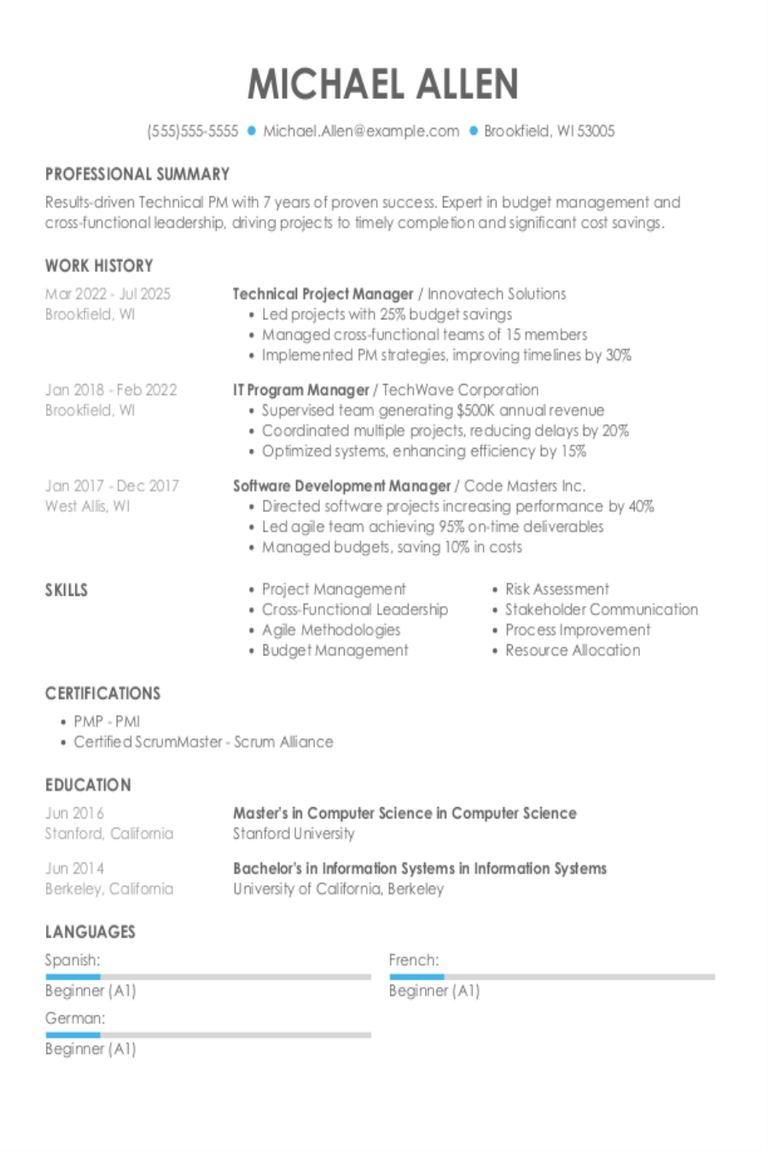Why this resume works
- Quantifies accomplishments: By creating over five user manuals monthly and boosting satisfaction by 20%, the applicant’s measurable accomplishments reveal tangible impact.
- Uses action-oriented language: Using action verbs like “created,” “authored,” and “collaborated” shows the applicant’s initiative and effectiveness.
- Illustrates problem-solving ability: Revamping documentation to cut support inquiries by 15% showcases innovative problem-solving skills.
More Technical Writer Resume Examples
Check out our technical writer resume examples to learn how to showcase your writing expertise, documentation experience, and attention to detail. Use these samples to help you create a resume for diverse technical writing roles.
Entry-level technical writer
Why this resume works
- Centers on academic background: The applicant’s academic foundation combines a master’s in technical communication and a bachelor’s in English literature, showcasing a solid basis for early career success in specialized writing fields.
- Effective use of keywords: Using keywords like “SEO optimization,” “content development,” and “process improvement” ensures compatibility with ATS systems and industry expectations.
- Shows digital literacy: Experience with creating user manuals, optimizing content, and improving documentation reflects versatile computer skills essential for thriving in digitally driven workplaces.
Mid-level technical writer
Why this resume works
- Points to measurable outcomes: The applicant’s track record of reducing documentation errors by 25% and boosting website traffic by 40% highlights their ability to drive measurable improvements.
- Demonstrates language abilities: By listing language skills in Spanish, French, and German, the applicant shows their ability to contribute through cross-cultural communication in diverse work environments.
- Includes a mix of soft and hard skills: Balancing technical writing with team leadership shows a strong mix of both hard skills and interpersonal skills, highlighting a well-rounded professional profile.
Experienced technical writer
Why this resume works
- Lists relevant certifications: By listing certifications like Certified Technical Writer and Information Mapping Professional, the applicant shows commitment to growth and expertise.
- Showcases impressive accomplishments: Achievements such as migrating over 200 documents to a new CMS reflect significant business impact, showcasing standout performance.
- Emphasizes leadership skills: Leading a team to revise outdated documents highlights how the applicant’s leadership skills allow them to manage projects effectively.
Technical Writer Resume Template (Text Version)
John Chen
Tacoma, WA 98402
(555)555-5555
John.Chen@example.com
Professional Summary
Accomplished Technical Writer with expertise in documentation and communication, generated high-quality manuals enhancing user satisfaction. Skilled in SEO and content management with proven track record in reducing inquiries and boosting visibility by 25%.
Work History
Technical Writer
TechNova Solutions – Tacoma, WA
June 2023 – June 2025
- Created 5+ user manuals monthly boosting user satisfaction by 20%
- Revamped documentation reducing customer support inquiries by 15%
- Collaborated with engineers enhancing technical accuracy by 25%
Content Specialist
InnoMedia Labs – Eastside, WA
February 2021 – May 2023
- Authored 30+ articles monthly increasing web traffic by 40%
- Mentored junior writers improving output quality by 35%
- Optimized SEO strategies leading to a 25% increase in visibility
Editorial Assistant
Innovatek Media – Silverlake, WA
June 2019 – January 2021
- Assisted in editing technical journals boosting accuracy by 30%
- Coordinated with authors reducing revision time by 20%
- Managed editorial calendar increasing publication timeliness by 25%
Languages
- Spanish – Beginner (A1)
- French – Intermediate (B1)
- German – Beginner (A1)
Skills
- Technical Writing
- User Documentation
- SEO
- Content Management
- Editing
- Project Coordination
- Communication
- Software Documentation
Certifications
- Certified Technical Writer – Technical Writers Association
- SEO Professional Certificate – Digital Marketing Institute
Education
Master of Arts Technical Communication
Stanford University Stanford, CA
May 2019
Bachelor of Arts English Literature
University of California, Berkeley Berkeley, CA
May 2017
Related Resume Guides
Advice for Writing Your Technical Writer Resume
Learn how to write a resume that highlights your ability to translate complex information into clear and engaging content. Whether you’re showcasing your knack for detail or your flair with words, we’ve got the insights to help you shine.

Highlight relevant technical skills
Technical skills are a big part of being a technical writer. They help you explain complex ideas clearly and accurately. You can make a special section called “technical skills” on your resume to show what you know. Or, you can talk about your skills when describing your past jobs. Either way, it’s important to highlight these skills so employers know you understand how to execute on the technical stuff.
For a technical writing job, some key skills might include:
- Using tools like Microsoft Word, Adobe Acrobat, or MadCap Flare
- Working with HTML or CSS
- Developing subject matter expertise
- Distilling complex information to make it easy to read for everyone
When listing your skills, be specific about what you’ve done with them in the past. For example, if you’ve used XML in a project, mention that experience in your work history section. This not only shows that you have the right skills but also proves you’ve used them before in real situations.
Example of a technical skills section
- Content management systems (WordPress, Drupal, Joomla)
- Structured authoring tools (MadCap Flare, Adobe FrameMaker)
- Version control systems (Git, SVN)
- Documentation standards and style guides (Chicago Manual of Style, Microsoft Manual of Style, AP Stylebook)
- Markup languages (HTML, XML, Markdown)
- Screen capture and graphic editing tools (Snagit, Adobe Photoshop)
- Collaboration platforms (Confluence, SharePoint)
- API documentation tools (SwaggerHub, Postman)
- Cloud-based writing and editing tools (Google Docs, Office 365)
Employers love seeing soft skills like teamwork, communication, and adaptability on your resume as well because they show you can work well with others and handle challenges.
Quantify your accomplishments
Quantifying accomplishments on a resume is key to standing out, especially for a technical writer. Instead of just listing tasks, focus on what you achieved while doing those tasks.
For example, instead of saying “wrote user manuals,” say “created 20+ user manuals that improved customer satisfaction by 30%.” This makes your resume more compelling because it shows real impact.
In the work experience section, each job entry should have your job title, employer name, location, and employment dates. These details help set the scene for your achievements. Then, turn duties into measurable achievements by using numbers to show success—like percentages or time savings.
Quantifying your accomplishments gives hiring managers an easy way to see your skills at work. If you reduced costs through clear documentation or streamlined processes that saved time, make sure it’s highlighted with action verbs and metrics. This results-driven approach paints a picture of someone who gets things done and contributes value.
By quantifying accomplishments clearly, hiring managers can quickly gauge your impact in previous roles as a technical writer. They get a sense of how you might fit their team based on past successes and improvements you’ve made. Using this method gives them confidence in your abilities beyond basic responsibilities.
5 technical writer work history bullet point examples
- Created and maintained 200+ comprehensive user manuals and online help guides, improving user satisfaction by 25%.
- Collaborated with cross-functional teams to design documentation templates, reducing writing time by 30%.
- Developed a streamlined documentation workflow, increasing publication speed by 40% while ensuring accuracy.
- Authored technical content for software releases, improving clarity and reducing support calls by 20%.
- Led a project to update legacy documents, resulting in a 50% improvement in information accessibility.
Want to make your resume stand out? Use professional resume examples for ideas and see how to highlight your skills like a pro.
Write a powerful professional summary
A professional summary and a resume objective are introductions on a resume that give hiring managers a quick look at who you are as a professional. A well-crafted summary or objective can make a strong first impression and set the tone for the rest of your resume.
A professional summary consists of three to four sentences highlighting your experience, skills, and achievements. It’s best for applicants with some work experience under their belts. The purpose of this section is to showcase your professional identity and demonstrate what you bring to potential employers in the role of a technical writer.
In contrast, resume objectives are statements outlining career goals. They’re ideal for those just starting out, changing careers, or with employment gaps. While summaries focus on “what I’ve accomplished,” objectives emphasize “what I aim to contribute.”
Next, let’s look at examples of both summaries and objectives tailored to different levels of experience.
Technical writer resume summary examples
Entry-level
Recent graduate with a Bachelor of Arts in English and a minor in technical communication, equipped with foundational skills in creating user-friendly documentation. Completed a certification in technical writing from Coursera, showcasing ability to craft clear and concise manuals and guides. Eager to contribute strong writing skills and attention to detail to support product development.
Mid-career
Technical writer with over five years of experience in the software industry, specializing in developing comprehensive user manuals, API documentation, and online help systems. Proven track record of collaborating with engineers and product managers to deliver accurate content that improves user experience. Recognized for improving documentation efficiency by implementing structured authoring practices.
Experienced
Seasoned technical writer with 10+ years of experience leading documentation teams across various industries including technology, finance, and healthcare. Expert in DITA XML authoring tools and content management systems. Known for driving strategic initiatives that streamline documentation processes and improve knowledge sharing across global teams. Committed to mentoring junior writers and fostering an environment of continuous learning.
Technical writer resume objective examples
Recent graduate
Detail-oriented recent graduate with a Bachelor of Arts in English and a certificate in technical writing, eager to launch a career as a technical writer. Seeking to use strong writing skills and attention to detail in crafting clear and user-friendly documentation for technology products.
Career changer
Creative marketing professional transitioning into technical writing, bringing over three years of experience in content creation and communication. Driven to apply these skills in developing concise, informative manuals and guides that improve user understanding of complex systems.
Self-taught learner
Passionate self-taught writer with a background in customer support looking to break into the field of technical writing. Aims to combine problem-solving skills with a love for technology to produce accurate and helpful documentation that improves product usability and customer satisfaction.
Choose a resume template that’s clear and tidy, with bold headings and simple fonts for a professional look. Avoid fancy designs that might make your work history tough to read.
Showcase your credentials
Listing certifications, licenses, and specialized training is important for a technical writer because it shows expertise in specific tools, systems, or methodologies. In technical fields, these credentials can demonstrate your ability to understand and document complex technologies accurately.
A dedicated certifications section helps employers quickly see your qualifications and adds credibility to your resume. This section can complement your education details by showing how you’ve built skills through practical learning.
Some relevant certifications for technical writers, include:
- Google Technical Writing Certificate
- Certified Professional Technical Communicator (CPTC) Program
- Information Mapping Certified Professional™ (IMCP)
- Postman API Beginner Learner Path
- Medical Writer Certified (MWC)
By listing certifications that align with the systems or industries relevant to technical writing, you make your resume stand out. These credentials show that you’re up-to-date with current technology trends and capable of working with industry-standard platforms.
Including this information gives hiring managers confidence in your ability to handle complex documentation tasks.
Example of a certifications section
Technical Writing Certificate
Issued by: University of Washington
Issued 2019
MadCap Flare Certification
Issued by: MadCap Software
Expires 2026
Google Technical Writing Certificate
Issued by: Google for Developers
Issued 2022
When listing your certifications, include either the issue date or expiration date of each to show that your credential is current.
Salary Insights for Technical Writers
Knowing salary data can help you make smart choices about your career path or whether to move to a new place. The U.S. Bureau of Labor Statistics shares trends in pay across different jobs and fields. More details are provided below.
Top 10 highest-paying states for technical writers
Technical writers earn varying salaries across the United States, with a national average of $82,856. The table below highlights the states where technical writers command the highest compensation.
Our salary information comes from the U.S. Bureau of Labor Statistics’ Occupational Employment and Wage Statistics survey. This official government data provides the most comprehensive and reliable salary information for writers across all 50 states and the District of Columbia. The figures presented here reflect the May 2025 dataset, which is the most recent available as of this publication.
| State | Average Salary |
|---|---|
| California | $107,260 |
| Connecticut | $107,000 |
| Massachusetts | $106,090 |
| Vermont | $102,300 |
| Washington | $101,840 |
| New Hampshire | $99,610 |
| District of Columbia | $97,970 |
| Maryland | $97,900 |
| Oregon | $95,430 |
| North Carolina | $95,740 |
FAQ
Do I need to include a cover letter with my technical writer resume?
Yes, including a cover letter with your technical writer resume can make a strong impression and help you stand out.
A cover letter lets you highlight your communication skills by crafting a clear, concise narrative about your experience and interest in the role.
You can use it to emphasize specific projects where you showed expertise in simplifying complex information or tailoring content for different audiences.
If the company uses niche tools or focuses on certain industries, mention how your experience aligns with their needs to show you’re a great fit.
Consider reviewing cover letter examples for inspiration, or use the Cover Letter Generator to draft one that showcases relevant accomplishments effectively.
How long should a technical writer’s resume be?
For a technical writer, a one-page resume is often best to showcase your writing skills, familiarity with documentation tools, and relevant experience effectively. Focus on key achievements like creating manuals or working with cross-functional teams.
If you have extensive experience or specialized certifications, opting for a two-page resume can be worthwhile. Ensure every detail adds value by showing your ability in crafting clear and concise technical documents. Highlight recent roles and projects that reflect your expertise.
Check out our guide on how long a resume should be for examples and tips on finding the right length for your career stage.
How do you write a technical writer resume with no experience?
If you’re working on a resume with no experience, highlight transferable skills, education, and relevant projects that demonstrate your capacity to produce accurate and straightforward documentation. Use these strategies to kick off the process effectively:
- Highlight your education: Include any degrees or coursework in fields like English, communications, computer science, or technical writing. If possible, mention specific classes in writing, editing, or software tools.
- Showcase transferable skills: Highlight skills such as strong written communication, attention to detail, research abilities, or skill with tools like Microsoft Word, Google Docs, or Adobe Acrobat.
- Include relevant projects: List school assignments, personal projects, or volunteer work where you created user guides, manuals, FAQs, or other documentation. Be specific about what you wrote and the audience it was for.
- Learn and list industry tools: Familiarize yourself with common technical writing tools like MadCap Flare or Confluence. Even basic knowledge can set you apart as an entry-level applicant.
Tailor your resume to each job by using keywords from the job description and focusing on how your skills align with their needs.
Rate this article
Technical Writer
Additional Resources

Technical Marketing Manager Resume Examples & Templates for 2025
Discover how to craft a technical marketing manager resume that shines. Learn to highlight your tech-savvy skills, marketing strategies, and project successes effectively.Build my resumeImport existing resumeCustomize this templateWhy this

Technical Sales Manager Resume Examples & Templates for 2025
Discover how top technical sales managers highlight their key skills in technology and sales on their resumes. Learn how to showcase your experience and attract potential employers with our examples

Technical Support Engineer Resume Examples & Templates for 2025
Explore technical support engineer resumes that showcase problem-solving, customer service, and tech skills. Learn how to demonstrate you’re tech-savvy and ready to tackle any issue.Build my resumeImport existing resumeCustomize this

Technical Project Manager Resume Examples & Templates for 2025
Explore technical project manager resume examples that demonstrate expertise in managing software development, cloud integration, and cross-functional team leadership. Browse actionable tips on how to highlight your technical skills, Agile

